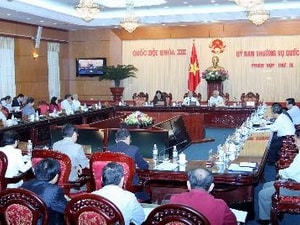The National Assembly Standing Committee discussed the draft Law on Citizen Reception.
Continuing the 16th session, on the morning of March 19, the National Assembly Standing Committee discussed and gave opinions on the draft Law on Citizen Reception. The draft Law will be submitted to the National Assembly (13th tenure) for first consideration at the 5th session.

The 16th session of the 13th National Assembly Standing Committee on the morning of March 19.
(Photo: An Dang/VNA)
According to the Government's Submission, the draft Law on Citizen Reception consists of 10 chapters and 71 articles, regulating the organization of citizen reception work of agencies, organizations and units; the rights and obligations of complainants, denouncers, petitioners, and reflectors; and civil servants receiving citizens; the responsibilities of heads of agencies, organizations and units in receiving citizens; the functions, tasks, powers and organization of the Citizen Reception Office; management of citizen reception work; conditions for ensuring citizen reception activities; rewards and handling of violations in citizen reception work.
Members of the National Assembly Standing Committee agreed with the need to promulgate the Law on Citizen Reception. In recent times, the State has promulgated a number of legal documents regulating citizen reception activities such as the Law on Complaints, the Law on Denunciations in 2011 and Decrees detailing a number of articles of the above laws. However, the content and methods of organizing citizen reception according to these legal documents and many other legal regulations have not yet met the requirements of practice.
Many opinions say that many provisions in the draft Law have not met the requirements for comprehensive innovation in the organization and operation of citizen reception. The draft Law also does not have clear provisions on the responsibility for citizen reception, the issue of coordination between agencies and organizations in citizen reception work, the model of organizing citizen reception headquarters at the central and local levels, the responsibility for coordinating the reception and handling of cases of complaints, recommendations, and reflections related to many agencies, units, organizations, and the mechanism for coordinating the provision of information...
Delegates suggested that the drafting committee should have in-depth reports on the current situation of citizen reception work, experiences of other countries in citizen reception activities; at the same time, demonstrate the feasibility of the draft Law after it is promulgated so that it can be submitted to the National Assembly for consideration and comments.
The majority of members of the National Assembly Standing Committee believe that most of the chapters and articles in the draft Law only focus on regulations on citizen reception in agencies within the state administrative system. But in reality, agencies have different functions and tasks in receiving citizens.
Members of the National Assembly Standing Committee suggested that the drafting agency should study and specify regulations on citizen reception by National Assembly deputies, People's Council deputies and other state agencies in the Law on Citizen Reception.
Regarding the provisions in Chapter IV on the functions, tasks, powers and organization of the Citizen Reception Office, citizen reception at the ministerial, district and commune levels, according to the Government's Submission, the Provincial Citizen Reception Office is defined as an agency with legal status, its own seal and account, and is assigned specific functions, tasks and powers. However, according to the National Assembly's Judicial Committee - the agency examining the draft law - it is said that the Citizen Reception Office is a place where citizens can directly come to make complaints, denunciations, petitions and reflections; it cannot be considered an independent agency with legal status as stipulated in the draft Law because it will invisibly create an intermediary agency between the people and the person with the authority to resolve complaints, denunciations, petitions and reflections...
The National Assembly's Judiciary Committee proposed that the draft Law should only focus on regulating standards, material conditions, the arrangement of locations of headquarters and places for receiving citizens, ways to coordinate activities at headquarters and places for receiving citizens, responsibilities for managing headquarters and places for receiving citizens, as well as some principles for developing internal regulations of headquarters and places for receiving citizens.
Members of the National Assembly Standing Committee said that the agency drafting and reviewing the draft law needs to continue researching and discussing to have unified regulations on this issue.
Members of the National Assembly Standing Committee also said that some provisions in the draft Law are still cumbersome, some contents overlap between chapters or repeat provisions already in other legal documents (especially the Law on Complaints and the Law on Denunciation). Members of the National Assembly Standing Committee suggested that the Government should continue to study and complete the draft Law so that the Law is truly the highest legal document regulating the work of receiving citizens.../.
According to (TTXVN) - LT
